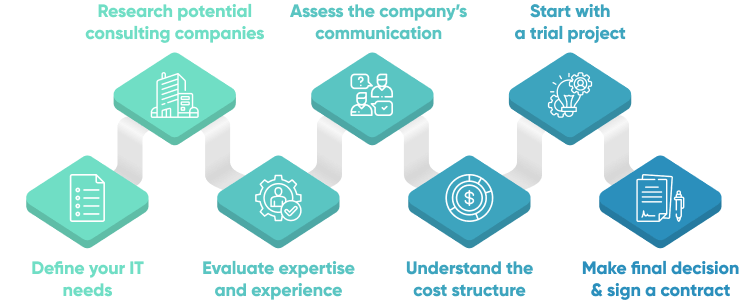83% of small businesses plan to boost their use of technology in the next two to three years. For many, the challenge lies not only in keeping up with technological advancements, but also in effectively integrating these tools into their operations.
Finding the right IT consulting partner can be the key to unlocking this potential, providing the expertise and guidance needed to navigate complex tech landscapes that small businesses are up against. In this guide we’ll walk through seven essential steps to identify and secure a consulting partner that aligns with your unique business needs, ensuring your technology investments drive efficiency, innovation, and sustained growth.
Why do small businesses choose IT business consulting services?
Small businesses are increasingly turning to IT business consulting services to stay competitive and efficient in today's technology-driven market. These services offer access to expert knowledge and cost-effective solutions, enabling businesses to focus on their core activities and strategic growth. Here are the top reasons small businesses choose IT consulting:
- Accelerated project timelines: IT consultants bring specialized skills and up-to-date knowledge and can significantly reduce the time required to complete IT initiatives.
- Cost efficiency: 37% of small business owners cite inflation as their biggest concern. To combat this, many are turning to IT consultants instead of maintaining expensive in-house IT teams.
- Focus on core business activities: By entrusting IT tasks to consultants, small businesses can concentrate on their main business functions instead of dealing with hiring, professional development, and other administrative burdens associated with maintaining an in-house IT team.
- Improved security: Small businesses account for 43% of all data breaches. Small business consulting services can provide an added layer of protection against cybercrime by offering robust cybersecurity measures and ensuring compliance with industry standards, safeguarding businesses from potential threats.
- Scalability and flexibility: Consulting services can be adjusted according to the business's needs. This flexibility is critical for managing IT resources efficiently and effectively, allowing businesses to scale their IT support up or down as demand and financial circumstances change.
7 steps to find the perfect small business IT consulting partner
Regardless of the specific benefits you’re after, finding a great IT consulting partner can be a game-changer for your small business. In this section we’ll walk you through seven essential steps to ensure you select a partner that aligns with your business needs and goals.

Define your IT needs
Finding an IT consulting partner begins with clearly defining your specific IT needs. This involves a thorough assessment of your current systems and identifying future requirements. Start by conducting a comprehensive review of your existing IT infrastructure, including hardware, software, networks, and security measures:
- Are our current hardware assets meeting performance expectations?
- Do we have any outdated equipment that needs replacement?
- What software do we currently use, and are there any issues with licenses or updates?
- Are we utilizing the full capabilities of our software applications?
- Is our network infrastructure reliable and providing the required speed?
- Are there any frequent connectivity issues or bottlenecks?
- What security measures are currently in place to protect our data?
- Are we compliant with industry standards and regulations?
Next, look ahead and align your IT infrastructure with your business goals for the next few years. Consider questions such as:
- What are our main business goals for the next 1-3 years? How can technology help us achieve these goals?
- Is AI a good fit for our business, and if so, how could it be used?
- What other future technology trends or innovations could impact our industry?
- Are we utilizing cloud computing services effectively, and are there opportunities for further cloud adoption?
By considering these factors, you can ensure your IT strategy aligns with your long-term business objectives, making your technology investments more effective and future-proof.
8 Ways to Harness the Power of Small Business Technologies
7 Critical Steps to Assess Your Small Business Software Needs
Research potential consulting companies
Once you have defined your IT needs, the next step is to research potential consulting companies that meet your needs. Start by creating a list of potential IT consulting firms.
While we’ve been specifically looking at IT consulting in this article, it’s worth considering exactly what kind of consulting you’re after - or if consulting is even what you’re after at all. Reviewing these most common IT services will help you narrow in on the companies that align with your needs.
Most IT companies will offer a variety of services, with some overlap to be expected. But, in general, the more clear you are on the type of service you’re looking for, the easier it will be to find companies that will fit the bill. Some of the most services include:

Consulting hours:
- Advisory services - If you need strategic guidance and advice, look for firms that offer consulting hours. These services typically include IT assessments, strategy development, and technology roadmapping.
- On-demand support - For businesses that need occasional technical assistance, consider firms that provide on-demand support. This can be an economical way to get expert help without long-term commitments.
Project-based services:
- Solution implementation - For businesses looking to integrate various IT systems, identify consulting firms with experience in system integration. They should have a track record of successfully merging different platforms and ensuring seamless data flow.
- Custom software solution - If you require small business software solutions, seek out firms with a strong portfolio in building applications similar to what you need. Look for expertise in specific technologies and frameworks.
Managed services:
- IT management - For ongoing IT management, consider firms that offer managed services. This includes monitoring and maintaining your IT infrastructure, providing continuous support, and managing security.
- Cybersecurity - If security is a primary concern, look for firms specializing in cybersecurity. They should offer services such as vulnerability assessments, threat monitoring, and compliance management.
PRO TIP: There are plenty of resources where you can find IT consulting partners:
- Use Google to search for IT companies. Both paid and organic results can be helpful. From individual company websites you can get information on their software development services, industries they work with, their previous clients and their work processes.
- Browse software development review and rankings websites. One of the most popular of them is Clutch. You can view the search results by location, minimum project size, average hourly rate, industry focus, and more. This is also a great place to take a look at past client reviews!
- Leverage your professional network by asking for recommendations from colleagues, business partners, and industry peers.
Evaluate expertise and experience
After compiling a list of potential consulting companies, the next step is to evaluate their technical expertise and experience to ensure they align with your specific needs. This involves a detailed assessment of their industry experience, technical skills, and past performance:
Relevance to your sector:
- Do the consulting firms have a proven track record of success in your industry?
- Have they worked with businesses of a similar size?
- Can they provide case studies, portfolios, and client lists showcasing their industry experience?
Technical skills and expertise:
- Can they demonstrate expertise with the specific technologies and solutions you plan to implement?
- What specific skills and certifications do the consultants possess?
- Do they have qualifications from reputable organizations (e.g., Microsoft, AWS)?
- Have they completed similar projects successfully in the past?
- Can they provide project histories and client testimonials?
Assess the company’s communication

Effective communication is crucial for a successful partnership with a small business IT consulting firm. The investigation and interview stage is the ideal time to evaluate this. If communication is lacking now, don't assume it will improve once the project begins. Specifically, consider:
- Responsiveness: Evaluate how quickly and efficiently the consulting firm responds to your inquiries. A firm that is prompt in its communications is more likely to be reliable and proactive in addressing your needs.
- Clarity and transparency: Consider how clearly the small business consultant or project management team communicates its processes, pricing, and project timelines. Transparency in these areas helps build trust and ensures there are no hidden surprises down the line.
- Understanding your needs: Assess whether the consulting firm takes the time to fully understand your business requirements and objectives. Effective communication involves not just speaking, but also listening and comprehending your unique needs.
- Communication style fit: Communication styles can be subjective and vary greatly between teams and companies. Ensure that the consulting firm's communication style fits well within your team's expectations and culture. Whether you prefer formal, structured updates or more casual, frequent check-ins, it's important that their approach aligns with your preferences.
Understand the cost structure
Understanding the cost structure of potential consulting partners is essential for making an informed decision. Here’s how to effectively compare pricing models and evaluate cost versus value. Consulting firms typically offer different pricing models. It’s important to understand these to find the one that best fits your needs.
- Hourly rates: Ideal for short-term projects or tasks where the scope may change frequently. This model provides flexibility and allows you to pay for only the hours worked. Exact hourly rates vary based on the location of the small business consultant, their experience level, and exact services provided, typically ranging anywhere from $50 to well over $300/hr (at SoftKraft we offer strong value for money with consulting services at $75-$100 range).
- Fixed project fees: Best for projects with well-defined scopes and deliverables. This model offers predictability in costs, as you pay a predetermined amount for the entire project. It is beneficial for projects where the requirements are clear, and the scope is unlikely to change.
- Retainer agreements: Suitable for ongoing support and long-term partnerships. Retainer agreements involve paying a set fee on a regular basis (monthly, quarterly, etc.) for a defined set of services. This model ensures continuous support and can be adjusted based on the business's evolving needs.
When evaluating cost versus value, it’s important to look beyond the price tag and assess the overall value the consulting firm brings to your business. More experienced consultants might charge higher rates, but their expertise can lead to more efficient and effective solutions. Consider the potential return on investment (ROI); higher upfront costs can be justified if they result in long-term savings or revenue growth. Additionally, higher costs may correlate with better service quality, leading to fewer issues and better outcomes.
Start with a trial project
Before committing to a long-term partnership, it’s wise to start with a trial - or proof of concept - project. This allows you to evaluate the small business IT consulting firm’s capabilities, communication, and overall fit with your business.
Begin by defining a small, manageable project that addresses a specific need or problem within your small business IT infrastructure. This project should be representative of the type of IT consultancy services you expect the consulting firm to handle in the future, but small enough to limit potential risk and investment.
Questions to consider during the trial project:
- How effectively does the consulting firm communicate and collaborate with your team?
- Are they meeting the project deadlines and staying within budget?
- How proficient are they in addressing the technical challenges of the project?
- Is their approach to problem-solving aligned with your expectations?
PRO TIP: Clearly outline the objectives, scope, and success criteria for the trial project before it begins. This will provide a benchmark for evaluating the small business consulting firm’s performance and help you make a more objective decision about continuing the partnership.
Read More: 8 Step Proof of Concept Template – Validate Your Idea Fast
Make final decision & sign a contract
After completing a successful trial project and thoroughly evaluating all aspects of potential consulting companies, it's time to make your final decision and formalize the partnership with a contract. When signing a contract with a small business IT consulting company, it's important to understand the terms of the contract and to make sure the contract is tailored to your needs. Here are three key things to make sure to do:
- Read the contract thoroughly. Make sure to read the entire contract and ask questions if there's anything you don't understand. The contract should contain details including scope of work, deliverables, timelines, payment terms, and any contingencies for changes or unforeseen issues.
- Negotiate. Don't be afraid to negotiate the terms of the contract if you're not satisfied with the initial offer.
- Have an attorney review it. It's a good idea to have a lawyer review the contract before signing it to make sure all of your rights are protected.
By taking the time to make sure the contract is fair and meets your needs, you can ensure that you have a successful web development project. Now the exciting part comes - you get to kickoff your development project!
SoftKraft - IT consulting services for small business
Are you looking for a small business IT consultant? We’d love to help! At SoftKraft we offer small business software development services to help small businesses like yours navigate the complex tech landscape. From on-demand IT consulting services to end-to-end custom software development, we can help. Reach out to our team today for a free quote.
Conclusion
A strong IT consulting partner will be instrumental in driving your technology initiatives and supporting your growth. By following the steps outlined in this article, you'll be well-equipped to find a partner that truly understands your unique needs. Take your time, do your research, and don't hesitate to start with a small project to ensure a good fit.







